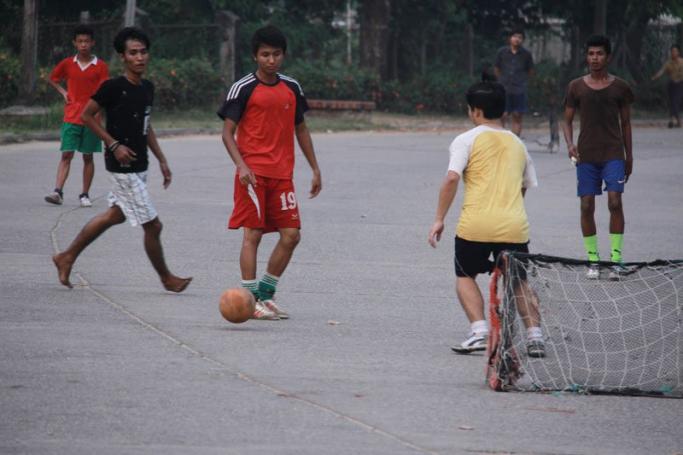Yangon’s Thuwunna Sports Ground, built in 1985, was the largest in Myanmar until 2013. It is also a youth training centre. The stadium has an international-standard football arena and is surrounded by a large space paved with concrete where dozens of young men can be seen playing every day. They are seemingly oblivious to the towering stadium as they concentrate on their informal games like professional players. It’s a scene that powerfully illustrates the paucity in Yangon of public areas for recreational use where residents and visitors can enjoy sport for free. There is an obvious need for more public recreational places in the commercial capital.
Football grounds are essential for the development of professional football players. Myanmar Football Federation vice-president U Banny Tin Aung once said that without playgrounds, professional footballers would not emerge. Football is hugely popular in Myanmar and youngsters grab every opportunity to kick a ball with friends. But with a shortage of pitches their only alternative is to play roadside football.
Although Myanmar launched a professional competition in 2009, the roadside football league culture had already existed for more than two decades. Each team usually plays with four or five players and their competitions are
informally known as small goal matches. They are played with time or goal limits to decide the winner.
Gambling on roadside football games is common. “We gamble on games and the bets can range from soft drinks and snacks to several hundred thousand kyats,” said Ko Thaung Htike, who plays roadside football near Thuwanna Sports Ground.
In some countries, such matches are called “street football” and the rules are different to those in Myanmar. Street football emphasises performance skills such as are demonstrated by chinlone (cane ball) players in Myanmar.
Fans of street football say it should be developed in Myanmar to make a bigger contribution to the game.
“Street football style is very expressive,” said roadside football fan Ko K. Nanda, who has seen it played overseas. “They are playing to become professional players and for health and recreation,” he said. “ When the culture of street football is developed in Myanmar, our people will get more chances to become professional players.”
The cost of renting playing areas is another reason for roadside football competitions. Young people who want to play on a pitch or empty playing space in Yangon can expect to pay between K3,000 to K500,000 (about US$484) an hour in rent. If they can afford it, they can rent the Myanmar Football Federation’s futsal pitch or training ground with artificial grass. It costs K10,000 an hour to rent the futsal pitch and K100,000 an hour to play on artificial grass.
U Thein Win, who’s in charge of the MFF’s grounds, said it cost more than K100 million to install the two two futsal pitches and that each artificial grass pitch cost about K500 million.
The rent is reasonable because of the high investment, said Ko Cho, a resident of Yangon’s Kamaryut Township, which includes Yangon University. Ko Cho said it was nonsense to have to pay to play on the empty space in the campus at Yangon University, noting that the fee was K50 a person.
The shortage of public recreation areas and the cost of renting quality pitches means that roadside football competitions will continue to thrive in Yangon. Most roadside footballers play for fitness and pleasure and have no expectation of becoming professional players. There’s no doubt that many have the talent to become top players. Some of the country’s football stars began their careers in roadside football, an indication of the important role it plays in nurturing the sport in Myanmar. But how many more stars would be emerging in Myanmar football if there were better places to play than on tarred or concrete roads?
This Article first appeared in the March 26, 2015 edition of Mizzima Weekly.
Mizzima Weekly is available in print in Yangon through Innwa Bookstore and through online subscription at www.mzineplus.com
You are viewing the old site.
Please update your bookmark to https://eng.mizzima.com.
Mizzima Weekly Magazine Issue...
14 December 2023
New UK Burma sanctions welcome...
13 December 2023
Spring Revolution Daily News f...
13 December 2023
Spring Revolution Daily News f...
12 December 2023
Spring Revolution Daily News f...
11 December 2023
Spring Revolution Daily News f...
08 December 2023
Spring Revolution Daily News f...
07 December 2023
Diaspora journalists increasin...
07 December 2023
World Bank rep optimistic about Myanmar’s economy












